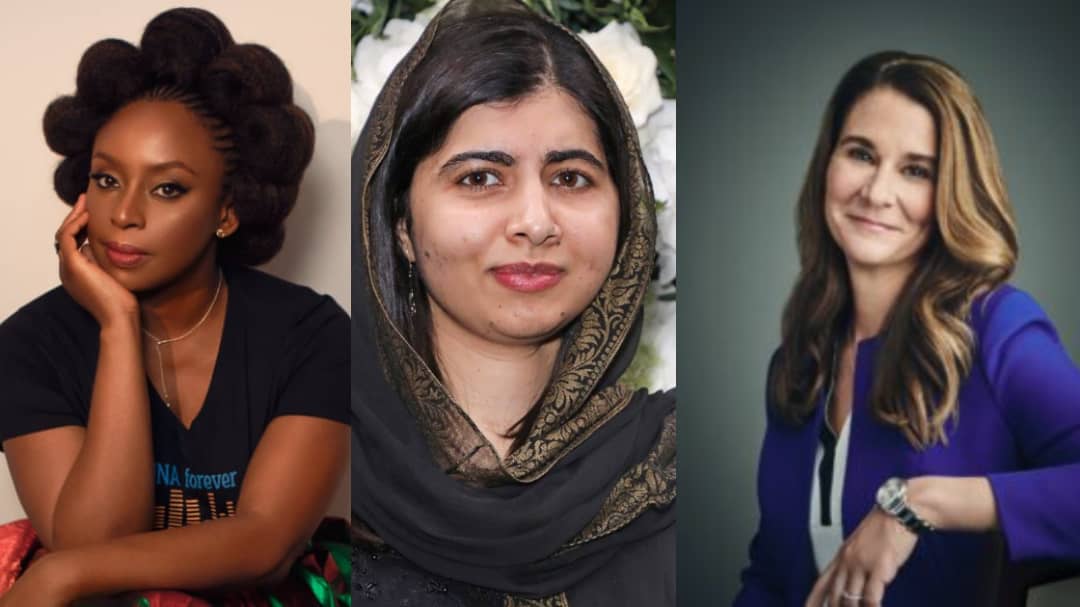NEWS
Melinda Gates, Chimamanda, Malala, others make 2021 BBC 100 most inspiring women list

The BBC has named renowned Nigerian author and feminist, Chimamanda Adichie on its annual list of 100 inspiring and impactful women from around the world for 2021.
A statement by Omawumi Ogbe of GLG Communications, said Chimamanda was listed under the “Culture and Education” category, which consists of 31 women out of the 100 chosen.
Under the post designated to the renowned writer, the BBC notes the 44-year-old’s TED Talk in 2012, We Should All Be Feminists, started a worldwide conversation about feminism and was published as a book in 2014.
“Let’s use this moment to start to think about health care as a human right everywhere in the world – what a person deserves simply by virtue of being alive, not when you can afford it,” said Chimamanda to the BBC.
The annual BBC #100Women list aims to inspire people by sharing the stories of trailblazing women across the globe who are using passion, indignation and anger to spark real change.
“This year 100 Women is highlighting those who are hitting “reset” – women playing their part to reinvent our society, our culture and our world,” said BBC. Women from Afghanistan make up half of this year’s list.
The list also includes a diverse range of female figures from leaders in politics, arts and business to everyday heroes fighting for what they believe in.
Among them are Malala Yousafzai, the youngest-ever Nobel Peace Prize laureate, Samoa’s first Female Prime Minister Fiamē Mata’afa, Prof. Heidi J Larson, who heads the Vaccine Confidence Project, and Philanthropist, businesswoman and a global advocate for women and girls, Melinda Gates who co-chairs the Bill & Melinda Gates Foundation.
The BBC also included at least two trans women among its list of 100 ‘most inspiring and influential women of 2021.
The broadcaster has at least two trans women on this year’s ‘inspirational women’ list, but MailOnline decided not to make their names public yet.
The inclusion of transgender women in this year’s list comes after BBC bosses decided to withdraw from a diversity scheme run by an LGBT charity because of the ‘risk of a perception of bias’.
Director of Nations Rhodri Talfan Davies said the public trust that the BBC can approach ‘very complex areas’ with complete impartiality is ‘the absolute bedrock’ of its decision-making.
But The Spectator claimed: ‘The point is that by including transwomen on a list of women, the BBC is taking sides in a contested issue.’
Meanwhile, the BBC said in a statement that it would not be renewing its participation in the Stonewall Diversity Champions Programme but will continue to work with a range of organisations to support its LGBT staff.
Mr. Talfan Davies told Women’s Hour the BBC is trying to create an inclusive working environment while ensuring it remains balanced with its output.
He said the issues of transgender and women’s rights are ‘highly polarised debates’.
‘The key thing for the BBC, as a broadcaster utterly committed to impartiality, is to ensure that audiences have trust in us to come into these very complex areas dispassionately and fairly,’ he said.
‘In the case of the Stonewall Diversity Champions Programme, it had led to questions about whether the BBC could be truly impartial when reporting on public policy debates like this, given that Stonewall has an active campaigning role in this space.
‘For that reason, we believe it’s the right time to step back from that programme.’
This year the BBC’s Women’s list ‘is highlighting women playing their part to reinvent our society’ and is dominated by inspirational women from Afghanistan.







